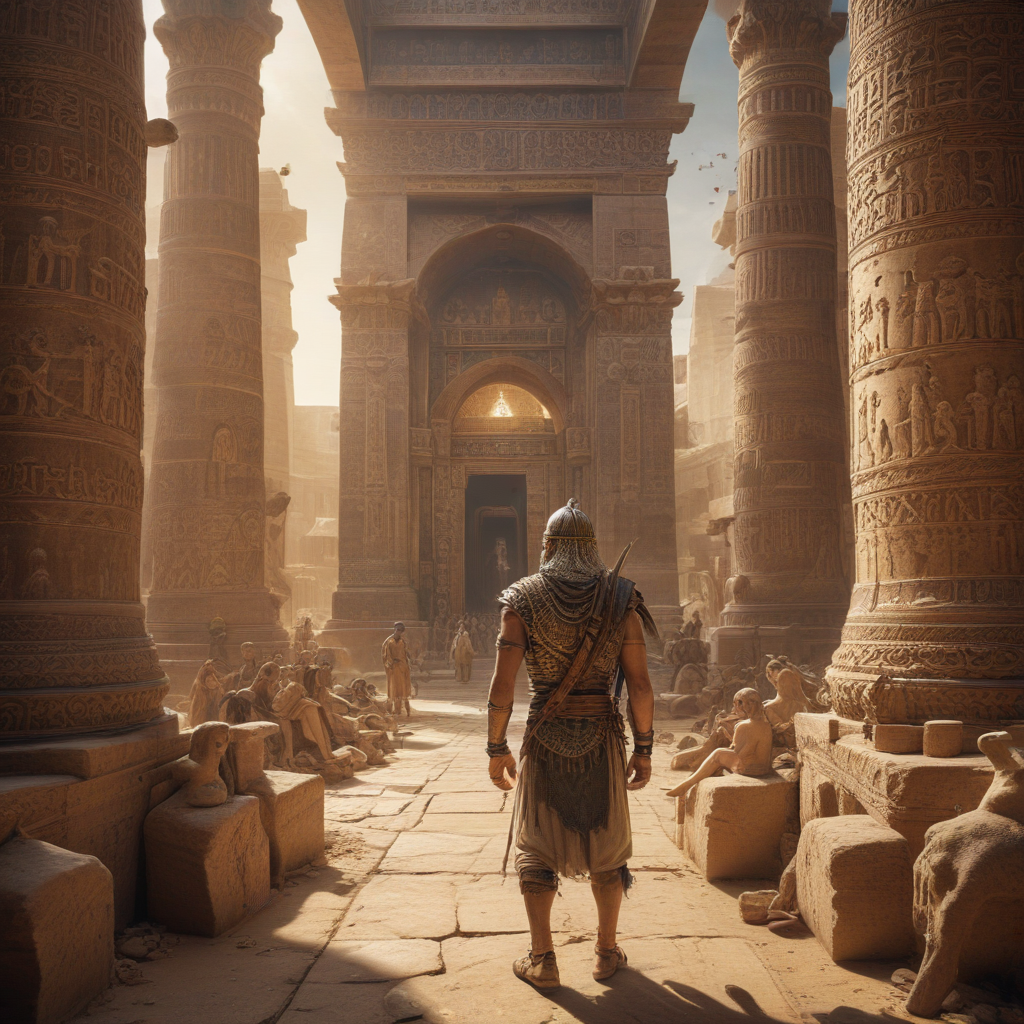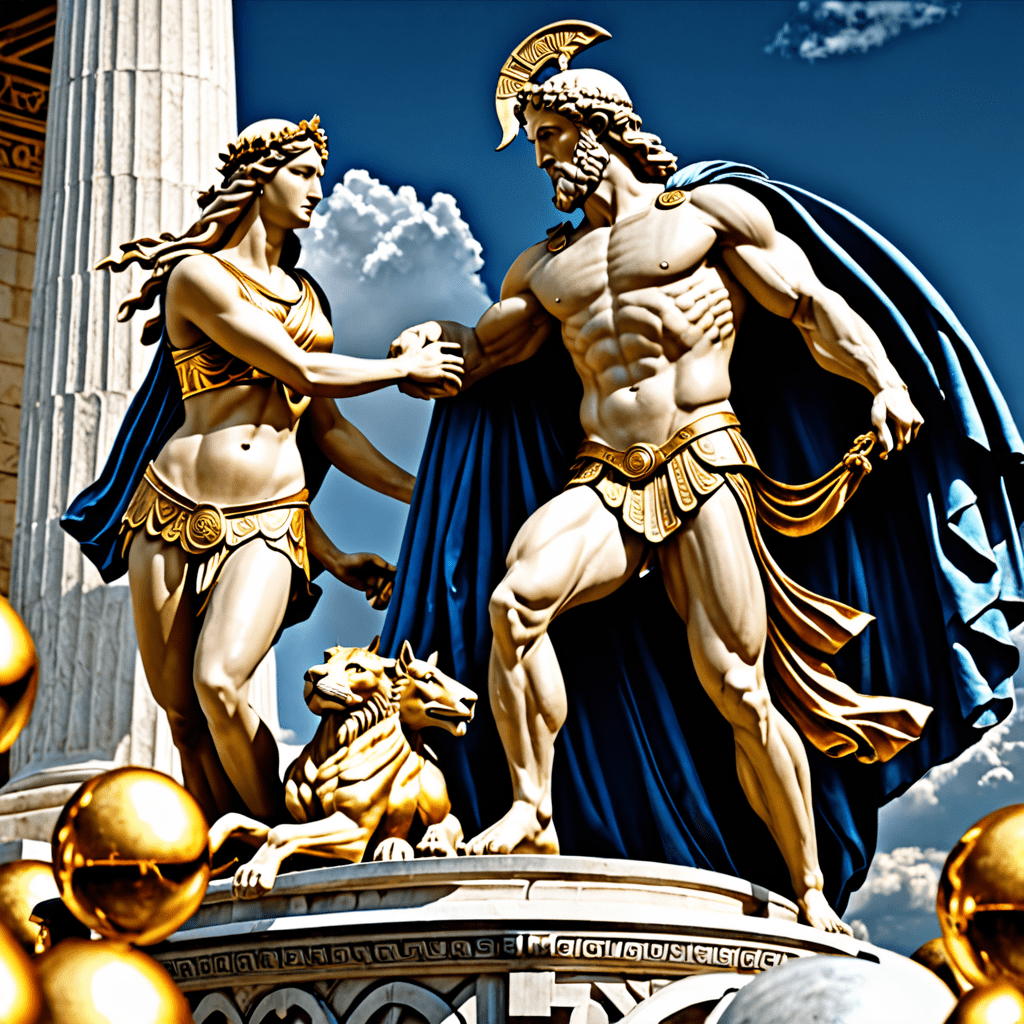The Legend of Enmerkar and the Lord of Aratta: A Tale of Rival City-States in Mesopotamian Mythology
Introduction
The ancient near east was a land of fertile plains, mighty rivers, and thriving city-states. These city-states were often embroiled in power struggles, vying for control of vital resources and strategic advantages. This rivalry is vividly illustrated in the legend of Enmerkar and the Lord of Aratta, a story that captures the complex political and religious dynamics of the Sumerian and Akkadian civilizations.
The Story of Enmerkar and the Lord of Aratta
Enmerkar, the king of Uruk, a prominent Sumerian city-state, receives a message from the Lord of Aratta, a powerful city located in the mountains. The message from Aratta demands that Uruk submit to its rule and pay tribute. Enmerkar, unwilling to yield to Aratta's demands, devises a plan to challenge the Lord of Aratta's authority.
Enmerkar sends a series of messages to Aratta, each laden with increasingly valuable gifts. These gifts are designed to show the Lord of Aratta the wealth and power of Uruk and subtly undermine his authority. However, the Lord of Aratta remains undeterred, responding with his own gifts of even greater value.
Recognizing the need for a more decisive action, Enmerkar invokes the assistance of the god Enki, the Sumerian god of wisdom and water. Enki advises Enmerkar to send a final message to Aratta, promising that he will bring the storm god Ishkur to Aratta to devastate the city. This threat proves effective, and the Lord of Aratta finally relents, agreeing to submit to Uruk's rule and pay tribute.
The Significance of Enmerkar and the Lord of Aratta
The legend of Enmerkar and the Lord of Aratta is significant for several reasons. Firstly, it is one of the earliest known examples of Mesopotamian literature, dating back to the late third millennium BCE. This makes it a valuable source of information about the social and political structures of the Sumerian and Akkadian civilizations.
Secondly, the legend sheds light on the relationship between city-states in Mesopotamia. It highlights the rivalry and competition that existed between these cities, as well as the importance of symbolic power and divine authority in maintaining dominance.
Finally, the legend reveals the complex religious beliefs of the Mesopotamians. The involvement of gods like Enki and Ishkur in the narrative demonstrates the importance of divine intervention in human affairs and the belief in the power of deities to shape the course of events.
The Political Landscape of Mesopotamia
The legend of Enmerkar and the Lord of Aratta takes place during a period of great political upheaval in Mesopotamia. The rise of powerful city-states like Uruk and Aratta led to intense competition for control of resources and trade routes. This rivalry frequently erupted into warfare, as cities sought to expand their influence and assert their dominance over their neighbors.
The legend reflects the political realities of this era, depicting
The Power Struggle Between Enmerkar and the Lord of Aratta
The legend of Enmerkar and the Lord of Aratta showcases a power struggle between two rival cities, Uruk and Aratta. Uruk, under the rule of Enmerkar, is portrayed as the rising power, vying for dominance in the region. Aratta, represented by its unnamed lord, embodies the established authority, resistant to the usurping ambitions of Uruk.
Enmerkar's initial attempts to subdue Aratta through diplomacy and lavish gifts reflect his calculated approach to power acquisition. He strategically employs these tactics to flaunt Uruk's wealth and challenge Aratta's authority without resorting to direct military confrontation. However, the Lord of Aratta remains unyielding, demonstrating his determination to maintain Aratta's position as the leading power.
This persistent resistance forces Enmerkar to escalate his tactics, seeking the intervention of Enki, the Sumerian deity of water and wisdom. This act underscores the significance of divine favor in Mesopotamian politics. By invoking Enki's support, Enmerkar seeks to legitimize his claims to power and exert pressure on Aratta through the threat of divine wrath.
The Role of Enki in the Legend
The involvement of Enki in the legend underscores the crucial role that deities played in shaping political outcomes in ancient Mesopotamia. Enki's wisdom and power were considered instrumental in resolving disputes and influencing the course of human events. His support for Uruk can be interpreted as a divine endorsement of the city's rising status and its potential to challenge the existing power structures.
Enki's advice to Enmerkar to invoke the power of the storm god Ishkur reveals the complex interplay between divine forces and political maneuvering. The threat of divine wrath served as a powerful tool to coerce and manipulate, reflecting the Mesopotamian belief in the direct influence of deities on earthly affairs.
The Symbolism of Gifts and Tributaries
The exchange of gifts between Enmerkar and the Lord of Aratta plays a significant symbolic role in the narrative. The lavish gifts sent by Enmerkar represent a strategic attempt to demonstrate Uruk's wealth and influence, subtly undermining the authority of the Lord of Aratta. These gifts serve as a form of political maneuvering, showcasing Uruk's potential as a dominant power and implicitly suggesting Aratta's relative decline.
The demand for tribute from Aratta further emphasizes the power dynamics at play. Tribute payments were a customary practice among Mesopotamian city-states, signifying submission and acknowledging the dominance of the receiving party. Enmerkar's insistence on tribute reinforces his ambition to assert Uruk's authority over Aratta and consolidate his position as the leading power in the region.
The Use of Divine Intervention
The legend of Enmerkar and the Lord of Aratta highlights the prevalent belief in divine intervention and the role of deities in influencing human affairs. Enmerkar's reliance on Enki's support and his use of the threat of Ishkur's wrath underscore the Mesopotamian perception of the gods as active participants in human events. The outcome of the power struggle is ultimately determined not just by political maneuvering but also by the perceived will of the divine forces.
The story demonstrates how Mesopotamian rulers strategically utilized religious beliefs and the authority of deities to further their political goals. By invoking divine intervention, they sought to legitimize their claims to power, gain an advantage in political conflicts, and exert influence over their rivals.
The Impact of the Legend on Mesopotamian Culture
The legend of Enmerkar and the Lord of Aratta has had a lasting impact on Mesopotamian culture, shaping its literary traditions and religious beliefs. The story has been recounted and adapted over centuries, becoming a foundational myth for the Sumerian and Akkadian civilizations.
The legend provides insights into the political landscape, religious beliefs, and social values of ancient Mesopotamia. It highlights the importance of diplomacy, power struggles, and divine intervention in shaping the course of events. Moreover, it showcases the intricate relationship between political authority and religious legitimacy in Mesopotamian society.
The enduring popularity of the legend reflects its significance as a cultural artifact that has captured the imagination of generations and continues to offer valuable insights into the complexities of Mesopotamian society.
Frequently Asked Questions:
1. Who are Enmerkar and the Lord of Aratta?
- Enmerkar, the king of Uruk, was a prominent figure in Sumerian mythology and history.
- The Lord of Aratta, whose name remains unknown, represents the ruler of the rival city of Aratta in the legend.
2. What is the main conflict in the story?
- The primary conflict is the power struggle between the rising city-state of Uruk, led by Enmerkar, and the established authority of Aratta, ruled by its unnamed lord.
3. Why does Enmerkar send gifts to Aratta?
- Enmerkar sends lavish gifts as a strategic maneuver to showcase Uruk's wealth and undermine Aratta's authority, without resorting to direct confrontation.
4. Who is Enki, and why is his role significant?
- Enki is the Sumerian god of wisdom and water, whose support Enmerkar seeks to legitimize his claims to power and exert pressure on Aratta through the threat of divine wrath.
5. What is the symbolic significance of gifts and tribute in the legend?
- The gifts represent Uruk's wealth and potential as a dominant force, while tribute payments signify submission and acknowledge Aratta's subordination to Uruk's authority.


